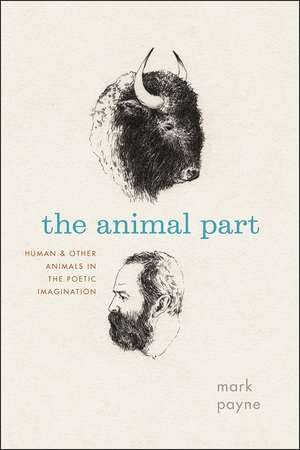The Animal Part – Human and Other Animals in the Poetic Imagination
Autor Mark Payneen Limba Engleză Paperback – 7 mai 2015
The Animal Part also makes substantial contributions to the emerging discourse of the posthumanities. Payne offers detailed accounts of the tenuousness of the idea of the human in ancient literature and philosophy and then goes on to argue that close reading must remain a central practice of literary study if posthumanism is to articulate its own prehistory. For it is only through fine-grained literary interpretation that we can recover the poetic thinking about animals that has always existed alongside philosophical constructions of the human. In sum, The Animal Part marks a breakthrough in animal studies and offers a significant contribution to comparative poetics.
Preț: 216.78 lei
Nou
Puncte Express: 325
Preț estimativ în valută:
41.49€ • 43.77$ • 34.57£
41.49€ • 43.77$ • 34.57£
Carte tipărită la comandă
Livrare economică 02-16 ianuarie 25
Preluare comenzi: 021 569.72.76
Specificații
ISBN-13: 9780226272320
ISBN-10: 022627232X
Pagini: 174
Ilustrații: black & white illustrations
Dimensiuni: 152 x 229 x 10 mm
Greutate: 0.27 kg
Editura: University of Chicago Press
ISBN-10: 022627232X
Pagini: 174
Ilustrații: black & white illustrations
Dimensiuni: 152 x 229 x 10 mm
Greutate: 0.27 kg
Editura: University of Chicago Press
Notă biografică
Mark Payne is professor in the Department of Classics and a member of the Committee on Social Thought at the University of Chicago. He is the author of Theocritus and the Invention of Fiction.
Cuprins
Acknowledgments
Introduction. Imagining Animals
Part One. The Abject Animal
1. The Beast in Pain: Abjection and Aggression in Archilochus and William Carlos Williams
2. Destruction and Creation: The Work of Men and Animals in Gustave Flaubert, Gerald Manley Hopkins, and Ezra Pound
Part Two. Becoming Something Else
3. Beyond the Pale: Joining the Society of Animals in Aristophanes, Herman Melville, and Louis-Ferdinand Céline
4. Changing Bodies: Being and Becoming an Animal in Semonides, Ovid, and H. P. Lovecraft
Epilogue. I Do Not Know What It Is I Am Like
References
Index
Introduction. Imagining Animals
Part One. The Abject Animal
1. The Beast in Pain: Abjection and Aggression in Archilochus and William Carlos Williams
2. Destruction and Creation: The Work of Men and Animals in Gustave Flaubert, Gerald Manley Hopkins, and Ezra Pound
Part Two. Becoming Something Else
3. Beyond the Pale: Joining the Society of Animals in Aristophanes, Herman Melville, and Louis-Ferdinand Céline
4. Changing Bodies: Being and Becoming an Animal in Semonides, Ovid, and H. P. Lovecraft
Epilogue. I Do Not Know What It Is I Am Like
References
Index
Recenzii
“Eclectic and intriguing, The Animal Part urges us to take seriously literary works that create imaginative identifications of staged encounters with the nonhuman world. Considerations of human relations to animals could not be more timely, and Mark Payne adds a powerful and original voice to the discussion.”
“The Animal Part is like a conversation with a learned and perceptive friend. In a very original manner, Mark Payne contemplates human beings’ engagement with their own status as animals among other animals and considers the ways in which poetry enables a privileged access to an imaginative, imaginary inhabiting of the species being of others. I enjoyed this moving and powerful meditative essay on human being immensely.”
“A powerful and very individual exploration of how ancient and modern authors have used the relationship between humans and animals as a central part of their art-works.”
“A fascinating and very well-written book on aspects of representations of animal/human relations that have been little studied.”
“Mark Payne has crafted a durable, thoughtful, short book, one that those interested in the writers he views should amble, swim, hike, or navigate a long way in order to read.”
"There is much to treasure and mull over in this book—it is a brave contribution to an exciting body of work and a stimulating assertion of the continued rewards of studying classical literature, even, and especially, in a post-humanist era."
